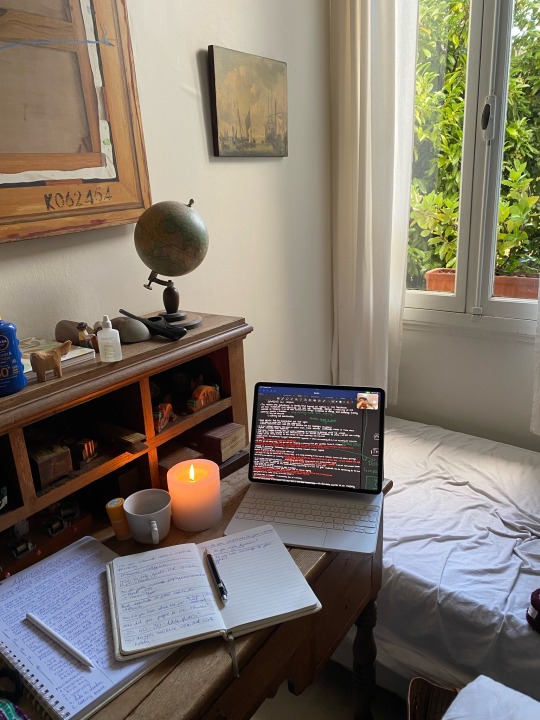Study Advice | Business Student | Passion for Finance | 22 k Followers
Don't wanna be here? Send us removal request.
Text




<3
#studyblr#motivation to study#studygram#studying#study motivation#books and libraries#study tips#studyspo#study notes#quotes#100 days of productivity
149 notes
·
View notes
Text




Good morning from sunny Bordeaux. Writing 20 pages for my thesis today! Love you all!
Girls in Finance project server // other posts
1K notes
·
View notes
Text
How I Manage to Study 15 Hours a Day



Girls in Finance project server // other posts
As I love studying, I have found some tips that have helped me throughout the years to stay efficient during long study days. I adapted these tips to my personality: I am a very loving and compassionate person, thereby I give myself a lot of support through those.
So, let's infuse warmth, love, and a fighting spirit into study tips:
Cherish Your Goals:
Embrace tasks that align with your dreams. Who do you want to be in life? Vision yourself being that person! I always look at my goals in the form of a vision board and become super happy.
2. Study time is a privilege:
Treat each moment as a gift. Sometimes we might think that we are "forced" to study. However, it is a privilege that we are able to go to uni/school and thereby work on our future.
3. Focus, One Task at a Time:
Devote your heart to one task at a time. Sometimes we do feel tempted to switch, but I would suggest staying disciplined with one subject/one task at a time.
4. Breaks are Important:
Gift yourself short breaks filled with something that motivates you: Looking at your vision board, past achievement, etc. I always look back on what I have achieved so far and that instantly makes me more motivated and gives me a clear mind.
5. Nourish Your Body:
Really do your best to keep to a balanced diet, as it has been proven that enough water and a healthy diet can increase concentration and keeps you healthy.
6. Goals, Sweet Milestones:
Set goals as gentle companions on your journey! Celebrate each accomplishment with a loving heart! You are doing so well! Really fill your heart with the happiness of achieving small goals and milestones.
7. Reflect with Compassion:
Tenderly reflect on your journey and seek feedback. There is always room for improvement. And even if you fail to be efficient at times, there is always a tomorrow and you learn from your mistakes.
That's it, remember, efficiency is not solely about the number of hours spent studying but about making the most of the time invested. <3 I love you all!! Feel free to reach out!
Girls in Finance project server // other posts
352 notes
·
View notes
Text


I managed to get a straight A+ average (>4.0 GPA) last semester. OMG. I am so happy!!!
#studyblr#motivation to study#study tips#study notes#studygram#studying#study motivation#books and libraries#studyspo
612 notes
·
View notes
Text




✨In my Elle Woods Era ✨
#studyblr#studygram#motivation to study#study tips#study notes#studying#study motivation#books and libraries#quotes#studyspo
216 notes
·
View notes
Text
How to Stay Motivated and Productive While Studying with a Broken Heart
Dealing with a broken heart is tough. It’s like carrying a heavy weight around while trying to keep up with everything else—especially studying. When your mind is clouded with sadness, and your energy is drained, staying motivated and productive can feel nearly impossible. But here’s the good news: you can get through this. With a little extra care and some strategic planning, you can still hit those study goals, even when your heart’s hurting. Here’s how.
1. Allow Yourself to Feel
First things first: don’t try to bottle up your emotions. Ignoring your feelings will only make them harder to deal with in the long run. Take time to acknowledge and process what you’re going through. If you need to cry, vent, or just sit with your emotions for a bit, that’s okay. Giving yourself space to feel can help you clear your mind and refocus when it’s time to hit the books.
2. Set Small, Achievable Goals
When you’re heartbroken, even the simplest tasks can feel overwhelming. Instead of pressuring yourself to conquer huge study sessions, start with small, manageable goals. Maybe it’s reading one chapter, reviewing one section of notes, or solving a few practice problems. These bite-sized tasks are easier to tackle and give you a sense of accomplishment that can help rebuild your confidence.
3. Create a Comforting Study Space
Your environment can have a big impact on your mood and productivity. Set up a study space that feels comforting and safe—somewhere you can focus without distractions. Add things that make you feel better, like a cozy blanket, your favorite snacks, or a calming playlist. A little extra comfort can go a long way in helping you stay on track.
4. Use the Pomodoro Technique with a Twist
When your heart is heavy, concentrating for long periods can be tough. The Pomodoro Technique is great for this, but with a twist: after each 25-minute study session, give yourself a longer, more nurturing break. Use that time to do something kind for yourself—whether it’s going for a walk, listening to a soothing song, or indulging in a guilty pleasure show. Balancing work with self-care is key.
5. Lean on Your Support System
You don’t have to go through this alone. Reach out to friends, family, or even online communities for support. Talking things out can be incredibly therapeutic and can help lift some of the emotional weight off your shoulders. Plus, having someone to check in with can keep you accountable and motivated to keep going, even when you don’t feel like it.
6. Focus on What You Can Control
Heartbreak often comes with a lot of uncertainty and things you can’t control. Shift your focus to what you can control—like your study habits, your schedule, and your self-care routine. Taking charge of these areas can give you a sense of empowerment and help you regain some stability in your life.
7. Turn to Your Studies as a Distraction
Sometimes, diving into your studies can be a welcome escape from the pain. Let your academic goals serve as a temporary distraction—a way to shift your focus from what you’ve lost to what you can still achieve. Channeling your energy into learning something new or mastering a tough subject can be incredibly rewarding and might even help speed up the healing process.
8. Practice Mindfulness and Meditation
When emotions are running high, it can be hard to focus on anything else. Mindfulness and meditation are great tools for calming your mind and bringing your attention back to the present moment. Even just a few minutes of deep breathing or guided meditation can help you feel more centered and ready to tackle your studies.
9. Be Gentle with Yourself
It’s important to recognize that you’re going through a difficult time, and it’s okay if you’re not at 100% right now. Be kind to yourself, and don’t beat yourself up if you’re not as productive as you’d like to be. Progress is progress, no matter how small, and taking things one step at a time is completely okay.
10. Reward Yourself for Effort, Not Just Results
When you’re studying with a broken heart, the effort you put in matters just as much as the results. Reward yourself for showing up and trying, even if you don’t hit every goal perfectly. Celebrate the small victories, like completing a study session or understanding a tough concept, and give yourself credit for pushing through despite everything.
11. Visualize Your Future
It might be hard to see right now, but this pain will pass, and your future is still full of possibilities. Take a moment to visualize where you want to be after the heartbreak fades. Picture yourself succeeding in your studies, achieving your goals, and feeling proud of how far you’ve come. This future-focused mindset can help pull you through the tough moments.
12. Seek Professional Help if Needed
If your heartbreak feels too heavy to bear alone, it’s okay to seek help from a counselor or therapist. They can provide you with tools and strategies to cope with your emotions while still staying on track with your academic goals. There’s no shame in asking for help when you need it.
Final Thoughts
Studying while dealing with a broken heart is no easy feat, but it’s absolutely possible. By setting small goals, creating a comforting study environment, and balancing your work with self-care, you can stay motivated and productive, even during tough times. Remember, it’s okay to take things slow and be kind to yourself along the way. Healing takes time, but with patience and perseverance, you’ll get through this—and come out stronger on the other side. 💖
#study notes#studying#study motivation#study tips#motivation to study#books and libraries#studyblr#quotes#studyspo#studygram
78 notes
·
View notes
Text
Mastering Time Management: Tips to Get Your Life Organized ❤️
Time management is like a superpower that everyone wishes they had, but it’s not as mysterious as it seems. With the right strategies, you can manage your time effectively, reduce stress, and make more room for the things you love. Whether you’re juggling school, work, or just trying to stay on top of life’s endless to-do list, these tips will help you get organized and stay productive. Let’s dive in!
1. Set Clear Priorities
Before you can manage your time, you need to know what’s most important. Take a few minutes to list out your top priorities—whether it’s work, school, personal projects, or self-care. Once you’ve identified these, it becomes easier to focus your energy on what really matters. Remember, not everything on your to-do list is urgent, so learn to prioritize and tackle the most important tasks first.
2. Break Tasks Down
Big tasks can feel overwhelming, leading to procrastination. The key is to break them down into smaller, manageable steps. For example, instead of writing “study for exams” on your list, break it down into “review Chapter 1,” “practice problems,” and “summarize notes.” Smaller tasks are easier to start and complete, and they give you a sense of progress.
3. Use a Planner or Digital Calendar
Whether you’re old-school with a paper planner or prefer digital tools like Google Calendar, having a place to organize your tasks and schedule is essential. Block out time for everything—work, study, exercise, and even relaxation. This visual layout helps you see how your time is being spent and makes it easier to stay on track.
4. Time Blocking
Time blocking is a powerful technique that involves dedicating specific chunks of time to different tasks or activities. For instance, you might block out 9-11 AM for deep work or studying, 11-12 PM for meetings, and so on. This method helps you stay focused and ensures that each important task gets the time it deserves. Plus, it’s a great way to avoid multitasking, which can actually reduce productivity.
5. The Pomodoro Technique
If you struggle with concentration, the Pomodoro Technique can be a game-changer. Work for 25 minutes, then take a 5-minute break. After four rounds, take a longer break (15-30 minutes). This method not only keeps you focused but also helps prevent burnout by giving you regular breaks to recharge.
6. Learn to Say No
This one’s tough, but essential. It’s easy to overcommit and end up with more tasks than you can handle. Learning to say no—politely but firmly—can free up your time for the things that truly matter. Remember, it’s better to do a few things well than to spread yourself too thin.
7. Eliminate Distractions
Distractions are the enemy of productivity. Whether it’s your phone, social media, or noisy environments, identify what pulls you away from your work and find ways to minimize it. Use apps like Focus@Will or website blockers like Freedom to help you stay in the zone.
8. Batch Similar Tasks Together
Grouping similar tasks together—like answering emails, making phone calls, or running errands—can save you a lot of time. This technique, known as task batching, reduces the mental energy required to switch between different types of tasks and helps you complete them more efficiently.
9. Set Deadlines (Even for Small Tasks)
Even if a task isn’t urgent, setting a deadline can give you that extra push to get it done. Deadlines create a sense of urgency, which can help you stay focused and avoid procrastination. Make sure your deadlines are realistic, and don’t forget to reward yourself when you meet them!
10. Review and Reflect Regularly
At the end of each week, take some time to review what you’ve accomplished and what still needs to be done. Reflect on what worked well and where you could improve. This regular check-in helps you stay on top of your tasks and adjust your approach as needed.
11. Prioritize Self-Care
Time management isn’t just about work—taking care of yourself is equally important. Make sure you’re scheduling time for sleep, exercise, and relaxation. When you’re well-rested and healthy, you’ll be more productive and better equipped to handle whatever comes your way.
12. Use the Two-Minute Rule
If a task can be done in two minutes or less, do it immediately. This rule, popularized by David Allen in Getting Things Done, helps prevent small tasks from piling up and overwhelming you. It’s a simple but effective way to keep your to-do list under control.
13. Be Kind to Yourself
Lastly, remember that no one’s perfect. There will be days when things don’t go according to plan, and that’s okay. Instead of getting frustrated, practice self-compassion. Learn from any setbacks and keep moving forward. Time management is a skill, and like any skill, it gets better with practice.
Final Thoughts
Time management doesn’t have to be a constant struggle. With the right tools and mindset, you can take control of your schedule and make more room for the things you love. Start by setting clear priorities, breaking tasks down, and using techniques like time blocking and the Pomodoro Technique to stay focused. And don’t forget to take care of yourself along the way—you’ll be amazed at how much more productive and motivated you’ll feel when you’re in a good place mentally and physically. You’ve got this! ❤️
Love,
Sophia
#studygram#study tips#studying#study motivation#study notes#books and libraries#motivation to study#studyblr#studyspo#quotes
29 notes
·
View notes
Text
How to Stay Motivated and Productive: Crushing Your Goals Without Burning Out
Staying motivated and productive can feel like a constant battle, especially when life throws distractions, stress, and endless to-do lists your way. But fear not! With the right mindset and strategies, you can keep your motivation high and your productivity on point, without burning out. Let’s dive into some tips to help you crush your goals and stay energized along the way.
1. Start with Your "Why"
Before you even think about getting stuff done, take a moment to connect with your “why.” Why do you want to achieve these goals? Whether it’s personal growth, career advancement, or simply getting through your day with your sanity intact, having a clear purpose fuels motivation. When the going gets tough, reminding yourself of the bigger picture can keep you pushing forward.
2. Set Clear, Realistic Goals
Productivity isn’t just about doing more; it’s about doing what matters. Break your goals down into specific, achievable tasks. Instead of vague goals like “get fit” or “study more,” try “exercise for 30 minutes three times a week” or “study for 45 minutes, then take a 15-minute break.” Clear goals give you a roadmap and make it easier to track your progress.
3. Create a Routine That Works for You
Routines are your best friend when it comes to staying productive. They help build momentum and reduce the mental energy spent on deciding what to do next. But remember, there’s no one-size-fits-all routine—what works for someone else might not work for you. Experiment with different schedules until you find one that aligns with your natural rhythms and lifestyle.
4. Embrace the Power of Small Wins
There’s nothing like the rush of ticking something off your to-do list. Those small wins build momentum and keep you motivated to tackle bigger tasks. Break larger projects into smaller, manageable steps, and celebrate each achievement along the way. It’s like giving yourself a mini high-five every time you complete something, and who doesn’t love that?
5. Use the Pomodoro Technique
If you struggle with staying focused, the Pomodoro Technique is a game-changer. Work for 25 minutes, then take a 5-minute break. After four sessions, take a longer break (15-30 minutes). This method not only helps maintain focus but also prevents burnout by ensuring you’re taking regular breaks. It’s a win-win for both your productivity and your well-being.
6. Declutter Your Space, Declutter Your Mind
A cluttered workspace can lead to a cluttered mind. Take a few minutes each day to tidy up your environment. A clean, organized space can help you feel more in control and focused on the task at hand. Plus, it’s one less thing to stress about when you’re trying to get in the zone.
7. Prioritize Self-Care
Productivity isn’t just about grinding 24/7. To stay motivated, you need to take care of yourself. Make sure you’re getting enough sleep, eating well, and staying active. Incorporate activities that relax and recharge you—whether it’s reading, meditating, or just chilling out with a good Netflix show. Remember, you can’t pour from an empty cup.
8. Mix It Up
Monotony can kill motivation. If you find yourself getting bored or stuck in a rut, mix things up. Try changing your environment—work from a different room or a coffee shop. Switch up your routine or try new productivity tools and techniques. Keeping things fresh can reignite your enthusiasm and keep you engaged.
9. Stay Accountable
Share your goals with a friend, family member, or even online communities. Having someone to check in with can keep you accountable and motivated. Plus, it’s a great way to get support and encouragement when you need it most. Sometimes, just knowing someone else is rooting for you is enough to keep you going.
10. Forgive Yourself for Off Days
Let’s be real—not every day is going to be a productivity powerhouse. Some days, the motivation just isn’t there, and that’s okay. The key is not to beat yourself up over it. Instead, acknowledge it, rest, and come back stronger the next day. Progress isn’t about being perfect; it’s about being consistent over time.
11. Visualize Your Success
Take a few minutes each day to visualize what success looks like for you. Imagine how it will feel to achieve your goals, and let that positive energy drive you forward. Visualization is a powerful tool that can help keep your motivation alive, even when the journey feels long.
12. Reward Yourself
Don’t forget to reward yourself for your hard work. Whether it’s treating yourself to something special, taking a day off, or just indulging in your favorite activity, rewards help reinforce the positive behavior of staying productive. It gives you something to look forward to and makes the grind feel a little less grindy.
13. Keep Learning and Growing
Finally, keep feeding your mind with new ideas and inspiration. Read books, listen to podcasts, watch TED Talks—whatever gets your creative juices flowing. Continuous learning keeps you motivated by reminding you that there’s always more to discover and achieve.
Final Thoughts
Staying motivated and productive isn’t about working harder—it’s about working smarter. By setting clear goals, creating a routine that works for you, and prioritizing self-care, you can stay on top of your game without burning out. Remember, it’s a marathon, not a sprint, so pace yourself, celebrate your progress, and keep moving forward. You’ve got this!
Love,
Sophia
#studygram#study tips#studying#study motivation#books and libraries#study notes#motivation to study#studyspo#quotes#studyblr
82 notes
·
View notes
Note
i love your page!! Happy Birthday ❤️❤️ How did you get over your shyness?
How I Conquered Shyness (And How You Can Too)
Hey, thank you so much for the birthday love! ❤️❤️ It means a lot! So, you’re curious about how I got over my shyness? Honestly, it’s been a journey, and it didn’t happen overnight. But I’m happy to share what worked for me in case it helps you out too!
1. Accepting That It’s Okay to Be Shy
The first step for me was accepting that being shy isn’t a bad thing. It’s just part of who I was at the time, and there’s no shame in that. Once I stopped beating myself up for being shy, it became easier to work on stepping out of my comfort zone. Acceptance was a big game-changer—it helped me start seeing shyness as something I could manage, rather than something holding me back.
2. Taking Small Steps
I didn’t suddenly start doing things that scared the heck out of me. I started small—like making eye contact with people, saying “hi” to strangers, or speaking up a bit more in class. These little steps helped me build confidence gradually. The more I did them, the less intimidating they became. It was all about proving to myself that I could do it.
3. Focusing on My Strengths
Instead of dwelling on what I found hard, I started focusing on what I was good at. I found that when I leaned into my strengths, whether it was in academics, hobbies, or other activities, it naturally boosted my confidence. When you feel good about what you’re doing, it’s easier to carry that confidence into other areas of your life.
4. Finding My People
Having a solid support system was huge for me. I found that surrounding myself with people who understood and accepted me made a big difference. Whether it was friends, family, or even online communities, having that sense of belonging helped me feel more comfortable being myself. It also gave me more opportunities to practice socializing in a safe space.
5. Challenging Negative Thoughts
Shyness often comes with a lot of self-doubt and negative self-talk. I worked hard on challenging those thoughts whenever they popped up. Instead of thinking, “Everyone’s going to judge me,” I’d remind myself that most people are too focused on their own lives to worry about what I’m doing. Changing my mindset helped me push through the fear of judgment.
6. Practicing Self-Compassion
I learned to be kind to myself when I didn’t push as hard as I wanted to. Not every social interaction is going to be perfect, and that’s okay. I started treating myself with the same kindness and understanding that I would offer a friend. This helped me bounce back from awkward moments without letting them define me.
7. Putting Myself in New Situations
After I got comfortable with the small steps, I started pushing myself into new and unfamiliar situations. It could be something like joining a new club, attending a social event, or taking on a leadership role in a group project. Each new experience was scary at first, but it helped me grow and showed me that I was capable of more than I thought.
8. Learning to Laugh at Myself
One of the best things I did was learn to laugh at myself. I stopped taking every little mistake or awkward moment so seriously. If I stumbled over my words or said something weird, I’d just laugh it off. This helped me stop fearing social interactions so much, because I knew I didn’t have to be perfect.
9. Keeping the Big Picture in Mind
Finally, I kept reminding myself why I wanted to overcome my shyness in the first place. Whether it was to make new friends, succeed in my career, or just feel more confident in my own skin, having that big-picture goal motivated me to keep pushing forward. It’s still something I work on, but I’ve come a long way, and so can you.
So, that’s my story. Remember, everyone’s journey is different, so what worked for me might need some tweaking to work for you. But the key is to start small, be kind to yourself, and keep pushing forward. You’ve got this! And thank you again for the birthday wishes—it made my day! 😊
#studyblr#motivation to study#study notes#study tips#studygram#studying#books and libraries#quotes#studyspo#study motivation
13 notes
·
View notes
Note
Hi!
As a student from Europe who has always excelled academically, I was surprised when my grades took a sudden dip last year in 10th grade. Despite my strong foundation in science, I found myself struggling to maintain the high level of performance I was accustomed to. Now that I'm on summer break, I'm determined to use this time wisely and find strategies to improve my grades for the upcoming school year. I would appreciate any advice or tips you can offer to help me achieve my academic goals and regain my confidence as a top-performing student.
How to Bounce Back After a Tough Year and Get Your Grades Back on Track
Hey there! First off, I want to say it’s really commendable that you’re taking this time during your summer break to reflect and plan ahead. It’s not easy to face a dip in grades, especially when you’ve always been a top performer. But the fact that you’re determined to turn things around says a lot about your drive and resilience. Let’s dive into some strategies to help you regain your confidence and achieve your academic goals next year.
1. Reflect on What Went Wrong
Before jumping into strategies, take some time to reflect on what might have contributed to your grades dropping last year. Was it the difficulty of the material, stress, time management issues, or something else? Understanding the root causes can help you address them directly, so you don’t fall into the same patterns.
2. Set Specific, Achievable Goals
Going into the new school year, set specific goals for what you want to achieve. Instead of just aiming to “do better,” break it down—maybe you want to improve your grades in specific subjects, manage your time better, or reduce stress. Having clear, tangible goals will give you something to focus on and help you track your progress throughout the year.
3. Create a Study Plan That Works for You
A solid study plan is key, but it needs to be one that suits your learning style and schedule. Start by organizing your time—block out periods for study, rest, and extracurricular activities. Make sure to include time for reviewing past material, especially in subjects where you struggled. Consistency is more important than cramming, so aim to study a bit each day rather than leaving everything to the last minute.
4. Focus on Understanding, Not Just Memorizing
It sounds like you’ve got a strong foundation in science, so use that to your advantage. Instead of just memorizing formulas or facts, dig deeper into understanding the concepts. Ask yourself why things work the way they do. This deeper understanding will help you retain information better and apply it more effectively in exams.
5. Use Active Learning Techniques
Passive reading or highlighting isn’t enough when you’re aiming to excel. Engage with the material actively—summarize notes in your own words, solve problems, and explain concepts to someone else (or even to yourself). The more actively you interact with the material, the better you’ll understand and remember it.
6. Don’t Be Afraid to Ask for Help
If you’re struggling with certain topics, don’t hesitate to ask for help. Whether it’s from teachers, classmates, or online resources, getting a different perspective can often make things click. There’s no shame in needing a bit of extra support—everyone does at some point, and it’s part of the learning process.
7. Work on Time Management and Organization
One common reason for a dip in grades is poor time management. Start using tools like planners, calendars, or apps to keep track of assignments, exams, and study sessions. Prioritize your tasks and tackle them one at a time, so you don’t feel overwhelmed. Staying organized can greatly reduce stress and help you stay on top of your workload.
8. Take Care of Your Mental and Physical Health
It’s easy to overlook self-care when you’re focused on academics, but your mental and physical health are just as important as your grades. Make sure you’re getting enough sleep, eating well, and finding time to relax. Stress management techniques like meditation, exercise, or even just taking a break to do something you enjoy can make a huge difference in your overall well-being and academic performance.
9. Practice Self-Compassion
Remember, everyone hits bumps in the road, and one tough year doesn’t define your entire academic journey. Be kind to yourself and recognize that setbacks are a natural part of growth. Use this summer to rebuild your confidence, and remind yourself of your past successes. You’ve excelled before, and you can do it again.
10. Stay Motivated and Keep the Big Picture in Mind
Finally, keep your eyes on the prize. Think about why you’re working hard—whether it’s to get into a good university, pursue a career in science, or simply to challenge yourself. Keeping the big picture in mind will help you stay motivated, even when things get tough.
You’ve got the summer to recharge and prepare, so use this time to build a strong foundation for the upcoming school year. With a clear plan and a positive mindset, you’ll be ready to tackle any challenge that comes your way. You’ve got this!
Love,
Sophia
#studygram#study notes#studying#motivation to study#books and libraries#study motivation#studyblr#study tips#quotes#studyspo
16 notes
·
View notes
Note
Any tips on how to create a proper schedule? I struggle a lot with time management.
Mastering Time Management: How to Create a Schedule That Works for You
Time management can be a tricky thing to master, but the good news is that with a little planning and a few smart strategies, you can create a schedule that keeps you on track and reduces your stress levels. If you’ve been struggling to get a handle on your time, don’t worry—you’re definitely not alone. Here’s how to create a proper schedule that works for you.
1. Start by Setting Clear Goals
Before you even think about scheduling, take a moment to define what you’re trying to achieve. Whether it’s finishing an assignment, studying for exams, or balancing school with extracurricular activities, knowing your goals will help you prioritize your time. Break these goals down into smaller, actionable tasks that you can tackle day by day.
2. Understand Your Natural Rhythm
Everyone has different times of day when they’re most productive. Some people are morning people, while others hit their stride later in the day. Pay attention to when you feel most alert and focused, and try to schedule your most challenging tasks during those times. Use less productive times for easier or routine tasks.
3. Use a Planner or Digital Calendar
Having a physical planner or using a digital calendar (like Google Calendar) is essential for keeping track of your time. Start by blocking out your fixed commitments like classes, work, or meetings. Then, fill in study sessions, homework time, and any other tasks. Don’t forget to include breaks and time for relaxation—these are crucial for avoiding burnout.
4. Prioritize Your Tasks
Not all tasks are created equal. Use the Eisenhower Matrix to categorize your tasks into four groups:
Urgent and Important: Do these first.
Important but Not Urgent: Schedule these.
Urgent but Not Important: Delegate if possible.
Not Urgent and Not Important: These can be minimized or eliminated.
By prioritizing your tasks this way, you ensure that you’re focusing on what really matters.
5. Break Tasks into Manageable Chunks
Large tasks can be overwhelming, leading to procrastination. Break them down into smaller, manageable pieces that you can tackle bit by bit. For example, instead of blocking out an entire day to “study biology,” break it down into specific chapters or topics to study in shorter sessions. This makes the task less daunting and helps maintain focus.
6. Set Realistic Time Blocks
When scheduling your tasks, be realistic about how long each one will take. It’s better to overestimate and have extra time left over than to underestimate and feel rushed. Start by tracking how long it actually takes you to complete different tasks, then use this data to plan your schedule more accurately.
7. Use the Pomodoro Technique
If you struggle with staying focused, try the Pomodoro Technique. This method involves working for 25 minutes, then taking a 5-minute break. After four cycles, take a longer break (15-30 minutes). This technique helps maintain focus and prevents burnout, especially during long study sessions.
8. Review and Adjust Your Schedule Regularly
Your schedule isn’t set in stone. Life happens, and things change, so it’s important to review and adjust your schedule regularly. At the end of each day or week, take a few minutes to assess what worked and what didn’t. If you find that certain tasks took longer than expected or that your priorities have shifted, make adjustments accordingly.
9. Build in Flexibility
While it’s important to stick to your schedule as much as possible, it’s also crucial to build in some flexibility. Allow for buffer time between tasks in case something takes longer than planned or if something unexpected comes up. Flexibility prevents you from feeling overwhelmed when things don’t go exactly as planned.
10. Stay Consistent, But Be Kind to Yourself
Consistency is key when it comes to following a schedule, but it’s also important to be kind to yourself. If you have an off day or something doesn’t go as planned, don’t beat yourself up. Simply adjust your schedule and keep moving forward. Remember, the goal is progress, not perfection.
11. Use Apps and Tools to Help
There are plenty of apps and tools designed to help with time management. Apps like Todoist, Trello, or Notion can help you organize your tasks and keep track of deadlines. Experiment with a few and find what works best for you.
12. Balance Work and Rest
Finally, remember that a good schedule isn’t just about getting work done—it’s also about ensuring you have time to rest and recharge. Make sure to schedule in downtime, hobbies, and social activities. A balanced schedule will keep you motivated and prevent burnout.
By implementing these tips, you’ll be well on your way to mastering time management and creating a schedule that supports your goals. It might take some trial and error to find what works best for you, but with persistence and a bit of flexibility, you’ll get there. Good luck, and happy scheduling!
Love,
Sophia
#studygram#motivation to study#study notes#study tips#books and libraries#study motivation#studying#studyblr#quotes#studyspo
27 notes
·
View notes
Note
I’ve got nothing to ask to be honest. Just saying hi I guess?
It’s been quite some time since I’m preparing for my exams and it’s due in 16 days.
I’m fuked in the brain department and my slime brain is writing this
Have a great day
Night folks
First off, hi! 👋 I feel you—sometimes, you just need to say it like it is, even if it’s just to vent into the void. Sounds like you’ve been deep in the exam trenches for a while now, and with just 16 days to go, it’s no wonder your brain’s feeling a little… well, slimy.
1. Embrace the Brain Slime
Let’s be real: exam prep can turn your brain into goo. But hey, that’s just a sign that you’re putting in the work. Sometimes, it’s about powering through even when your brain feels like it’s running on empty. Take it as a weird compliment—you’re pushing yourself, and that’s something to be proud of, even if it feels a little gross.
2. Quick Recharge Tips
With the finish line in sight, you’ve got to keep that brain functioning (even if it feels like it’s oozing out of your ears). Here’s a quick strategy to keep going:
Microbreaks: Every hour, take 5-10 minutes to just do nothing related to studying. Stare at the wall, stretch, grab a snack—whatever helps clear your mind, even briefly.
Power Naps: If you can squeeze in a 20-minute nap during the day, go for it. It’s like hitting the refresh button on your brain.
Hydrate & Snack Smart: Keep water and some brain-fueling snacks nearby. Think nuts, fruit, or dark chocolate—your brain will thank you.
3. Don’t Forget to Laugh
When your brain feels fried, sometimes the best medicine is just to laugh at the absurdity of it all. Watch a funny video, scroll through some memes, or just think about how ridiculous it is that we’re all in this same boat, turning our brains into mush over exams.
4. Countdown Mentality
16 days might feel like both an eternity and a blink at the same time. Try flipping the script—each day down is a day closer to being done. You’re in the home stretch now, and you’ve made it this far. Keep pushing, and just take it day by day.
5. Slime Brain Solidarity
Remember, you’re not alone in this brain-melty madness. Everyone prepping for exams is probably feeling some version of what you’re going through. We’re all just doing our best to get through it without completely losing it.
So hang in there, fellow slime brain. You’re almost there. And when you finally get to the other side, you’ll look back and laugh at how ridiculous it all seemed. Until then, keep going—slimy brain and all. Have a great day (or night), and good luck!
#studyblr#studygram#study tips#study notes#studying#study motivation#motivation to study#books and libraries#quotes#studyspo
7 notes
·
View notes
Note
I am starting my Masters this Fall and I am so scared and excited that I can't sleep. Lot of changes coming my way, do you have any advice? More importantly, how do I sleep? Is there a course I can take(just kidding)?
Hope you are having a good day :)
How to Tackle Pre-Masters Jitters and Actually Get Some Sleep
Hey! First of all, congrats on starting your Master’s this fall! It’s totally normal to feel a mix of excitement and nerves—it’s a big deal and a huge step forward in your life. But I get it, the anxiety can sometimes take over, making it hard to sleep and leaving you with a million thoughts racing through your head. Don’t worry, though—I’ve got some advice to help you navigate these changes and, more importantly, get some sleep.
1. Embrace the Excitement and the Fear
Let’s start with the fact that what you’re feeling is completely natural. Excitement and fear often come hand-in-hand with big changes, and starting a Master’s program is definitely one of those life-changing moments. Rather than trying to push the nerves away, acknowledge them. It’s okay to be scared—it means you care about what you’re about to do. Instead of letting that fear paralyze you, use it as motivation to prepare and take things one step at a time.
2. Plan, But Don’t Overthink
One way to channel your nervous energy is by planning ahead. Think about what you’ll need to succeed in your program—whether it’s organizing your study space, figuring out your schedule, or even planning your meals. But here’s the trick: don’t overthink it. You don’t have to have everything figured out before you even start. It’s okay to take it day by day. Planning should ease your mind, not add to your stress.
3. Connect with Future Classmates
You’re not alone in this—everyone else in your program is likely feeling the same mix of excitement and nerves. Reach out to future classmates through social media groups or orientation events. Building connections before classes start can give you a sense of community and make the transition a lot smoother. Plus, it’s nice to know you’ve got some friendly faces to turn to once you’re on campus.
4. Set Realistic Expectations
Grad school is challenging, and that’s the point. But you don’t need to be perfect. Set realistic expectations for yourself—there will be highs and lows, and that’s part of the journey. Give yourself permission to struggle sometimes, and remember that asking for help is a sign of strength, not weakness.
5. Find Balance Early On
As you dive into your studies, it’s important to find a balance between work and life. It might be tempting to throw yourself into your coursework 24/7, but burning out won’t help you in the long run. Make sure to carve out time for activities you enjoy, whether that’s hanging out with friends, exercising, or just binge-watching your favorite show. A balanced approach will keep you grounded and energized.
6. How to Sleep When Your Brain Won’t Shut Off
Now, let’s tackle the sleep issue. When your mind is racing, falling asleep can feel impossible. Here are a few tips to help you get some quality rest:
Create a Pre-Sleep Routine: Wind down with a consistent bedtime routine. This could be as simple as reading a book, listening to calming music, or doing some light stretching. Signal to your brain that it’s time to relax.
Limit Screen Time: Try to avoid screens at least an hour before bed. The blue light from phones and computers can mess with your sleep hormones, making it harder to fall asleep.
Write It Down: If you’re lying awake with a million thoughts, keep a notebook by your bed and jot them down. This can help clear your mind and stop you from worrying about forgetting something important.
Practice Deep Breathing or Meditation: Techniques like deep breathing, progressive muscle relaxation, or guided meditation can help calm your mind and body, making it easier to drift off to sleep.
Keep a Sleep-Friendly Environment: Make your bedroom a haven for sleep—keep it cool, dark, and quiet. Sometimes a small change like a new pillow or blackout curtains can make a big difference.
7. Give Yourself Time to Adjust
Big changes take time to get used to, and that’s okay. It’s normal to feel out of sorts for a while as you adjust to your new routine and environment. Be patient with yourself and remember that it’s a process. You don’t have to have everything figured out right away.
8. Remember Why You’re Doing This
When the nerves start to creep in, take a moment to remember why you’re pursuing this Master’s degree in the first place. You’ve worked hard to get here, and you’re following a path that’s important to you. Keep that in mind, and let it guide you through the tough moments.
So, take a deep breath—you’ve got this! The excitement, the fear, the sleepless nights—they’re all part of the journey. But with a bit of planning, some self-compassion, and a few deep breaths, you’ll find your rhythm. Enjoy the ride, and good luck with your Master’s!
#studyblr#motivation to study#studygram#study notes#studying#study motivation#study tips#quotes#studyspo#books and libraries
8 notes
·
View notes
Note
hey, I'm a senior at high school and I'm working towards engineering. I've got about 5 months till my main exam and I have a lot left to cover and revise. Can you please help me out with any advice or tips please. Thank you!!
How to Crush Your Last 5 Months Before Engineering Exams:
Hey there! First off, major props to you for aiming high and working towards engineering. With 5 months left until your big exam, it’s totally normal to feel a bit overwhelmed. But don’t worry—I’ve got some tips to help you make the most of the time you have left and go into that exam room feeling confident and prepared.
1. Break Down Your Syllabus
The first step is to get a clear picture of what you need to cover. Break down your syllabus into manageable chunks. This helps you avoid feeling swamped by everything you need to learn. For example, if you’ve got 10 topics to cover in 5 months, aim to thoroughly revise two topics per month. By dividing and conquering, you can focus on one thing at a time without getting overwhelmed.
2. Create a Realistic Study Plan
Once you’ve broken down your syllabus, it’s time to make a study plan that works for you. Be realistic—don’t cram 10 hours of study into a day if you know you can’t sustain that. Start by allocating specific topics to each week, and mix in some revision with your fresh learning. This way, you’re reinforcing what you already know while building on it.
3. Prioritize the Tough Stuff
It’s tempting to start with the subjects or topics you enjoy, but you’ll thank yourself later if you tackle the challenging ones first. Identify your weak spots and give them extra time and attention. It’s okay to struggle with certain concepts—that’s why you’re studying them! Use this time to work through difficulties and turn your weaknesses into strengths.
4. Active Learning Beats Passive Reading
Ditch the habit of just reading through textbooks or notes. Engage in active learning—take notes in your own words, solve problems, and teach concepts back to yourself or someone else. The more you interact with the material, the better you’ll understand and retain it. Practice problems are especially crucial for engineering, so get comfortable with working through them regularly.
5. Simulate Exam Conditions
As the exam date approaches, start doing timed practice exams under conditions that mimic the real thing. This will help you build up your stamina, manage time effectively, and get used to the pressure of the exam environment. Review your answers critically to understand where you went wrong and what you can improve.
6. Stay Consistent, But Flexible
Consistency is key when it comes to studying, but life happens. If you miss a study session, don’t beat yourself up—just get back on track as soon as you can. It’s okay to adjust your plan as you go, just make sure you’re steadily progressing. The goal is to keep moving forward, even if it’s not always at the pace you originally planned.
7. Don’t Neglect Your Health
It’s easy to forget about self-care when you’re knee-deep in exam prep, but your body and mind need to be in top shape to perform well. Make sure you’re getting enough sleep, eating balanced meals, and squeezing in some exercise. These habits will help keep your energy levels up and your mind sharp, so you’re ready to tackle those tough problems.
8. Stay Connected with Teachers and Peers
Don’t hesitate to reach out to your teachers if you’re stuck on something—they’re there to help! Forming a study group with your peers can also be incredibly helpful. You can exchange notes, quiz each other, and discuss difficult concepts. Sometimes, just talking through a problem with someone else can make things click.
9. Keep Stress in Check
It’s normal to feel stressed during this time, but don’t let it take over. Practice stress-management techniques like deep breathing, meditation, or even just taking short breaks to clear your head. Remember, you’re preparing for a big challenge, and it’s okay to feel the pressure—just don’t let it overwhelm you.
10. Believe in Yourself
Finally, trust in your abilities. You’ve made it this far, and with the right strategy, you can crush this exam. Stay positive, focus on what you can control, and remind yourself why you’re working so hard. Engineering is no small feat, but you’ve got the determination to make it happen.
With these tips, you’re on your way to making the most of the next 5 months. Stay focused, keep pushing, and remember—every bit of effort you put in now will pay off on exam day. You’ve got this!
#studyblr#studygram#motivation to study#study tips#study notes#studying#study motivation#books and libraries#quotes#studyspo
5 notes
·
View notes
Note
i always see people around me being more productive and starting revision earlier and doing everything much faster. i’m already trying my best, but i start panicking when i see them be better, and feel like i’m lagging behind. how do i snap out of this mentality?
How to Stop Panicking About Productivity:
We’ve all been there. You’re grinding away at your own pace, and then you glance around and see everyone else seemingly miles ahead. They’re breezing through tasks, acing their exams, and looking like they’ve got it all figured out. Meanwhile, you’re fighting off panic, convinced you’re falling behind. But before you spiral further, take a breath. You’re not alone, and there’s a way to snap out of this productivity panic.
1. Realize You’re Not in a Race
First off, let’s get one thing straight: life isn’t a race. Sure, it feels like everyone around you is speeding ahead, but that doesn’t mean you’re losing. Your journey is your own, and comparing your progress to others is like comparing apples to oranges. Different people have different strengths, learning styles, and paces. What works for someone else might not work for you, and that’s okay.
2. Practice Mindful Self-Compassion
When you catch yourself spiraling, pause and check in with yourself. Are you being too harsh on your own progress? Give yourself some credit. You’re doing your best, and that’s enough. Start practicing self-compassion by treating yourself like you would a friend who’s struggling. Would you tell them they’re a failure, or would you encourage them to keep going? Be your own cheerleader.
3. Focus on Your Progress, Not Theirs
It’s easy to get caught up in what everyone else is doing, but the only progress that really matters is your own. Take a moment to reflect on how far you’ve come instead of how far you think you have to go. Even small steps forward are still progress. Keep a journal or a list of what you’ve accomplished each day, no matter how minor it seems. This will help you stay grounded and motivated.
4. Set Realistic Goals and Celebrate Wins
Instead of trying to match someone else’s pace, set goals that are achievable for you. Break your tasks into manageable chunks, and celebrate each win, no matter how small. Finished a chapter? That’s a win. Wrote 200 words? That’s a win. You don’t need to conquer the world in a day—just keep moving forward at your pace.
5. Take Breaks and Recharge
Burnout is real, and it can sneak up on you if you’re constantly pushing yourself to keep up with others. Schedule regular breaks to recharge. Go for a walk, watch an episode of your favorite show, or just chill out for a bit. Remember, productivity isn’t about working nonstop; it’s about finding a sustainable rhythm.
6. Limit Social Media Consumption
Let’s be honest—social media can be a huge source of comparison and stress. Everyone’s posting their highlights, but you’re not seeing the full picture. Consider cutting back on your social media usage, especially when you’re feeling vulnerable. Out of sight, out of mind. Focus on your journey instead of getting sucked into someone else’s highlight reel.
7. Find a Support System
Surround yourself with people who uplift you. Whether it’s friends, family, or a study group, find a support system that encourages you rather than makes you feel inadequate. Share your struggles and victories with them; chances are, they’re feeling the same way too. A strong support system can make all the difference in keeping your mindset positive.
8. Accept That Perfection Isn’t the Goal
Perfectionism is a trap. Striving for perfection will only lead to more stress and dissatisfaction. Instead, aim for progress and improvement. Mistakes are part of the learning process, and they don’t define your worth. Embrace the idea that doing your best is more than enough.
9. Remember, You’re Doing Great
At the end of the day, it’s important to remind yourself that you’re doing just fine. The fact that you’re even worried about falling behind shows that you care about your progress. Don’t let the comparison game steal your joy and motivation. Keep your eyes on your own path, trust in your process, and give yourself the credit you deserve.
So next time you feel that productivity panic creeping in, take a step back, breathe, and remind yourself that you’re on your own unique journey. You’ve got this.
Best,
Sophia
#studyblr#studygram#motivation to study#study tips#study notes#studying#study motivation#quotes#books and libraries#studyspo
46 notes
·
View notes
Text
Which Study Tips/Content do you want to see?
Please comment and I'll make it happen. <3



#studyblr#studygram#motivation to study#study tips#study notes#studying#study motivation#books and libraries#quotes#studyspo
28 notes
·
View notes
Text




Busy day ahead ❤️
#studyblr#studygram#study tips#study notes#studying#study motivation#books and libraries#quotes#motivation to study#studyspo
82 notes
·
View notes